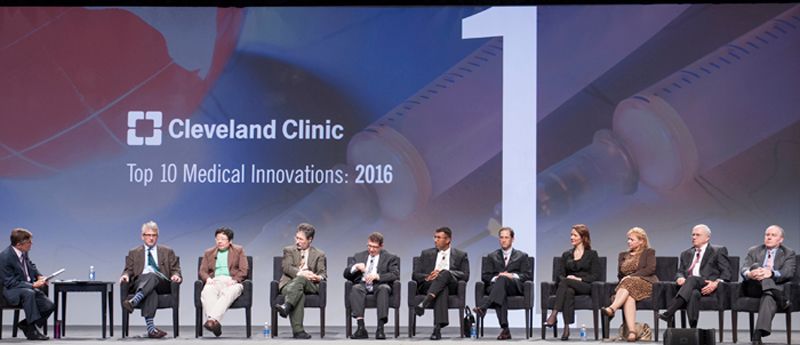Best Breakthroughs: Top Medical Innovations for 2016
Pharmaceutical Executive
Cleveland Clinic’s Top Medical Innovations for 2016.

The Cleveland Clinic’s 2016 Medical Innovation Summit caps its yearly
event with a Late Show-style Top 10 list bolstering “Amazing Science.”
Organizers drew on 75 Cleveland Clinic physicians and scientists to select the top drugs, medical devices, and public health initiatives they feel are poised to deliver huge potential impact in the coming year. Here are some of the highlights.
VACCINES TO PREVENT PUBLIC HEALTH EPIDEMICS
TOP 10 RANKING: #1
The need: Ebola and meningococcal B have reminded us in recent years that the threat of global scale infectious disease outbreaks remains a grave concern. The World Health Organization declared a public health emer- gency of international concern as 10,000 people died from Ebola in Sierra Leone, Guinea, and Liberia. And while Ebola travelers make headlines and travel advisories, meningococcal B has hit close to home with outbreaks in confined settings, including four on US college campuses from 2013 to 2015.
The fix: Researchers are springing into action, showing new levels of sophistication. The FDA has approved two vaccines against meningococcal B in recent years. In Ebola, clinical trials have been fast-tracked. A vaccine that may prove effective emerged in 12 months, and is expected to be available in 2016.
GENOMIC-DIRECTED CLINICAL TRIALS
TOP 10 RANKING: #2
The need: The randomized controlled trial, the gold standard of clinical research, has ruled the industry for 50-plus years. But patients often suffer long waits only to access trials that might not be suited to their specific variation of disease.
The fix: Genomic testing can help identify the molecular profile of a patient’s tumor or illness to better match them to clinical trials, while also increasing their chance of benefiting. Patients with rare and/or late-stage disease can be steered more efficiently towards a potentially life-saving therapy.
CANCER SCREENING VIA PROTEIN BIOMARKER ANALYSIS
TOP 10 RANKING: #6
The need: Poor sensitivity, specificity, and predictive value limit the diagnostic value of some tests, like those for prostate cancer that measure changes in the concentration of a single protein in a biologic fluid.
The fix: A new platform that detects changes in the structure of certain blood proteins can diagnose many types of cancer with high accuracy. In contrast to genetic testing that indicates a patient’s risk of developing cancer, the new test gives real-time information on the presence of cancer.
FRICTIONLESS REMOTE MONITORING
TOP 10 RANKING: #9
The need: Monitoring a biomarker like glucose for diabetics involves a lot of needles and pokes. Lessening such burdensome activities could go a long way in helping patients who are already suffering, as well as provide valuable data to the study of their diseases.
The fix: New methods like skin patches that measure biomarkers in sweat are one way researchers hope to reduce this burden and gain valuable insights at a distance. Such patches could be used to diagnose pregnancy, hypertension, or hydration with minimal friction or effort from the patient.
Casey McDonald is Pharm Exec's Senior Editor. He can be reached at cmcdonald@advanstar.com

FDA Grants Priority Review to Regeneron’s Eylea for Macular Edema Following Retinal Vein Occlusion
April 18th 2025Regulatory action was based on data from the Phase III QUASAR trial, which demonstrated that Eylea HD dosed every eight weeks achieved non-inferior visual acuity outcomes compared to Eylea in patients with macular edema following retinal vein occlusion.
Addressing Disparities in Psoriasis Trials: Takeda's Strategies for Inclusivity in Clinical Research
April 14th 2025LaShell Robinson, Head of Global Feasibility and Trial Equity at Takeda, speaks about the company's strategies to engage patients in underrepresented populations in its phase III psoriasis trials.
New Insights Into T Cell Exhaustion and Inflammation in Long COVID
April 17th 2025Nigel McCracken, chief operating officer, Virax Biolabs, discusses new findings that reveal altered cytokine activity and evidence of T cell exhaustion in long COVID patients, providing deeper insight into post-infection immune disruption.
Key Findings of the NIAGARA and HIMALAYA Trials
November 8th 2024In this episode of the Pharmaceutical Executive podcast, Shubh Goel, head of immuno-oncology, gastrointestinal tumors, US oncology business unit, AstraZeneca, discusses the findings of the NIAGARA trial in bladder cancer and the significance of the five-year overall survival data from the HIMALAYA trial, particularly the long-term efficacy of the STRIDE regimen for unresectable liver cancer.
Amgen’s Imdelltra Demonstrates Significant Overall Survival Improvement in Small Cell Lung Cancer
April 16th 2025In the Phase III DeLLphi-304 trial, patients with small cell lung cancer administered Imdelltra achieved a statistically significant and clinically meaningful improvement in overall survival compared to standard-of-care chemotherapy.